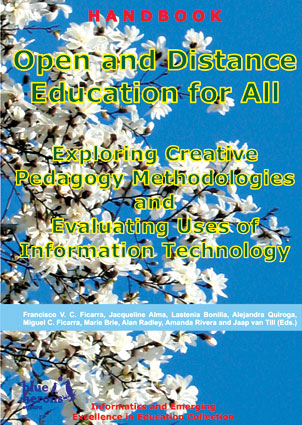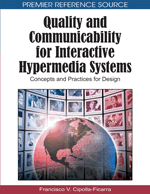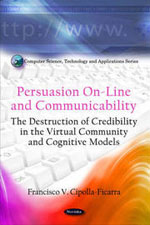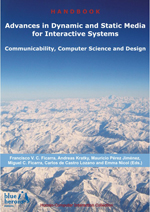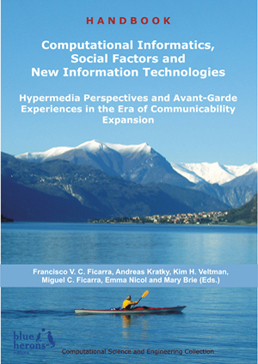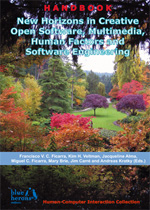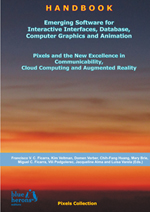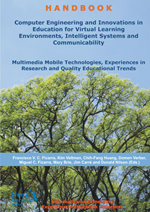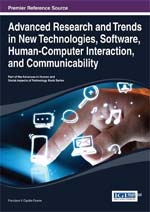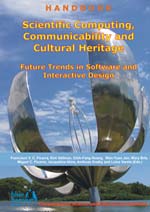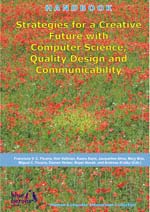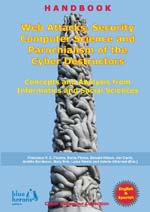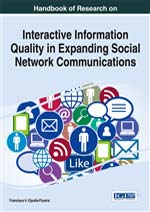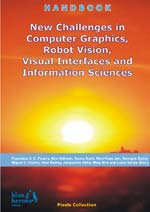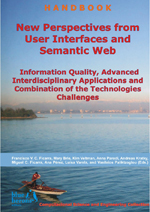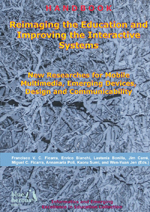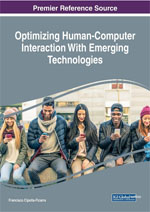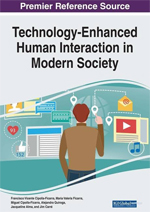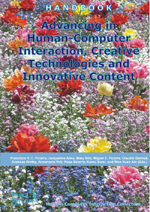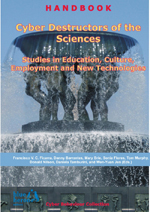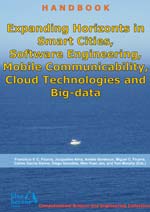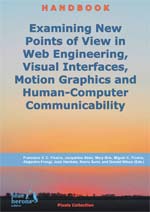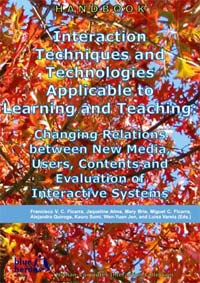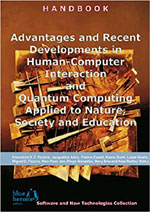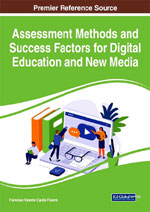Open and Distance Education for All: Exploring Creative Pedagogy Methodologies and Evaluating Uses of Information Technology
:: Informatics and Emerging Excellence in Education Collection ::
:: Revised Selected Chapters ::
Main Editor: Francisco V. C. Ficarra
Co-editors: Jacqueline Alma (Vancouver, Canada), Lastenia Bonilla (San José, Costa Rica), Mary Brie (La Valetta, Malta), Miguel C. Ficarra (Spain and Italy), Alejandra Quiroga (Sydney, Australia), Alan Radley (Blackpool, UK), Amanda Rivera (Mayagüez, Puerto Rico), Jaap van Till (Amsterdam, the Netherlands), Luisa Varela (Perpignan, France)
Editorial Assistants: Amélie Bordeaux (Lyon, France) and Donald Nilson (Oslo, Norway)
Book Details
• ISBN: 10979-12-80096-04-3 :: DOI: 10.979.1280096/043
• Publisher: Blue Herons Editions
• Location: Italy (Bg)
• Subjects: Virtual Classrooms, e-Learning, Software, Children-Computer Interaction, ICT, 3D
• Subjects: Students, Multimedia, Content, Evaluation, Management Systems, eBooks, UCD
• Subjects: Pedagogy, Videoconferencing, Virtual Tutors, Webinar, eBook, Blog, AR, MR, UX
• Subjects: Gardunia Factor, Podcast, Narco-Education, Narco-Ethics, Fake Feminism, R&D
• Subjects: Social Networks, Narcissism, Gender, Psychopathic Behaviour, STREAM, Africa
• Subjects: Hardware, Montessori Method, Covid-19, Creativity, Socialization, Smartphones
• Subjects: Think-aloud Protocols, Gap Educational, Social Context, Salamanca, Illegality, AI
• Subjects: MECEM, Blended Learning, Video-Games, Gamification, Funology, School, Java
• Subjects: UNESCO, Communicability, Moodle, Automation, Robotics, Flipped Classroom
• Subjects: iPad, Apple Pencil, IeFP, Hydraulic Robot Arms, Arduino, Python, C, C++, Users
• Subjects: MATLAB, Microsoft C#, Machiavelli, HCI, Scientific History, Literature Review, PC
• Subjects: University, Learning-S4D, Usability, Big Data, Data Destruction, Models, Interface
• Subjects: Philosophy, Psychology, Kindle, Information Retrieval, Neo-colonialism, Teachers
• Copyright: 2022
• Collection: Informatics and Emerging Excellence in Education
• Series volume: III
• Publication date: December, 2022
• Binding: Paperback
• Grade level: General
• Language: English
• Illustrations: Yes
• Colour: Yes
• Pages: 221
• Dimensions:11.41x8.26x0.51 in. 1.21 lbs. :: 290x210x13 mm. 551 gr.
Preface
Ignorance, the root and stem of all evil.
Plato (427 b.C. – 347 b.C.)
A new global healthcare context has clearly exposed the "utopian equation", where the sum of elite education, new technologies and globalization equals (hypothetically) a "higher quality of life" and "better social well-being." The reality in e-learning / virtual classrooms has indicated inefficient interactive systems, contents, theories, practices, and concepts (e.g., adaptive interfaces, augmented / mixed reality, children-computer interaction, gamification, human-computer interaction, information retrieval, interactive playgrounds, learning management systems, technological ecosystems, technology enhanced learning, user-centered design, and so on), obtained from deficiencies in the continuous training of professionals for such tasks. Faced with a local and global unexpected circumstances, there have been situations of demotivation to distance education and cognitive disorientation of teachers and students.
The results derived from a supposed training of educational or pseudo elitist excellence of future professionals in the ICT sector, through masters, specialization courses, doctorates, post-doctorates, etc. have been null. These professionals in the 21st century have exposed a myriad of shortcomings from the technological, pedagogical point of view, communication skills, and so forth, as well as in the basic notions of the distance teaching and learning process, through the use of traditional and / or inclusive technologies. Consequently, new educational cracks have opened, in the era of communicability expansion and that need a real and speedy repair.
Focusing on the common good, it is necessary to reformulate all the models and strategies used so far in the learning-teaching process, since human and formative quality must prevail over any index of scientific quantification online, within the group of people dedicated to the face-to-face and distance training. These are people, models and techniques that must be recycled and updated in light of the notions and technologies of social diffusion. Urgent solutions are required in the field of education, given the new sociological gaps between populations located in rural environments, large cities, smart cities, etc. and who daily resort to videoconferencing, virtual tutors, webinar, ebook, podcast, blog, and so forth.
All solutions must be focused on the didactic and technological resources available to potential students and teachers, in their usual work places –e.g., schools, institutes, universities, companies, associations, organizations, and so on–, with extension to homes. It aims to examine all those positive aspects that derive from the use of information technologies in the teaching-learning process, and that can be enhanced through the evaluation techniques, methods, strategies, and so forth, applied to innovative pedagogy.
Although it is not an easy task, from the point of view of human capital. The 21st century civilization is going through times of great setbacks in human values due to the rise of the Garduña / Gardunia / "G" Factor in education. This destructive factor in current education is hidden under false feminism and the use of new technologies, to mention an example. Apart from this complex reality to understand for many users of interactive systems, below you will find a brief summary of the research works presented, which are accompanied by their respective authors:
The author Valentina Rinoldi has chosen the following title for her chapter “Children and Creative Pedagogical Techniques: Experiments and Benefits of Montessori Method.” It investigates the application of the principles of the Montessori Method in the child population whose age ranges between 5 and 6, who have been isolated in their homes, during the lockdown period due to the Covid-19 pandemic. The author has structured several questionnaires, based on the videos received from the parents, at the time that the children were carrying out creative tasks related to drawing in analog or digital supports (i.e., computers, tablets, smartphones, and so on). Through the combination of various creative pedagogical techniques, they (author and parents) have been able to establish a “motivation & demotivation” index towards creative activities related to school. With the results obtained, she has generated an interactive application (App) to determine the degree of socialization of children throughout the day and the creative activities they develop. Valentina Rinoldi have carried out a wide state-of-the-art of the use of this method, computers and videoconference systems, with which the high index of bibliographical references collected can serve the interested reader as a kind of source of inspiration for future research in robotics for children, for example.
In the research work “The Gardunia Factor and Fake Feminist Perspectives on Science and Technology Education”, the authors are Francisco V. C. Ficarra and Alejandra Quiroga. They analyze the strategies followed by a group of Ibero / Latin America university professors, hypothetically “scientists” and “experts”, in e-learning, hybrid learning, virtual learning, artificial intelligence (AI), human-computer interaction (HCI), experience user (UX), user-centered design (UCD), virtual reality (VR), medicine, sport and a very long etcetera. The study begins by breaking down the tactic of hypocritically resorting to the notions of “deformation deontology”, “narco ethics”, “gender and fake feminism”, “science and technology education”, to avoid assuming work commitments in times of pandemic. Besides, the terrible use that they make of social networks to enhance and promote digital narcissism, psychopathic and sociopathic behaviour through audiovisual content is investigated. Finally, the sociological impact of these negative components is evaluated, specifically, in the use of new technologies aimed at the child, adolescent and adult population, and the progress of the STREAM (Science, Technology, Robotics, Engineering, Arts, and Mathematics) educated citizens. A series of appendixes are provided that include a summary of the comments and the examined case studies. There are also the tables of the results obtained from the experiments carried out with the end users, at the time of viewing the online audiovisual material with free access for all.
In this work “The Educational Projects and Technological Backwardness for People in Vulnerable Situations: The Case of Salamanca” the authors Antonia Mata Palomero, Luis Malmierca Hernández, Juana Cruz Arevalo, Raquel Rodríguez Porras, Inés Tejedor Martín and Ricardo Fraile Rojas present the new results obtained from the studies previously brought together in the work “Distance Education, Population Disorientation and Technological Lies in Times of Pandemic: The Case of Salamanca” (2020). In their research work, some members of that group continue to study the lack of interconnection between the University of Salamanca and the local educational and social context. They have examined the projects and publications that they carry out from the pedagogical and educational point of view, of various research groups and their directors, within that public university but managed as a private limited company or a bank, for instance. At the same time, they have developed and implemented an application (open software designed to run on smartphones and other multimedia mobile devices) that facilitates the detection of the gap or divergence between the practical and/or theoretical aspects of the university academic context and the potential needs to be covered, at all levels of education in Salamanca in emergency situations. This chapter has focused on the Covid-19 pandemic and higher education. A detailed analysis shows how personal interests have prevailed over the common good of society, taking advantage of the confusion and chaos in the evaluation systems of the educational process. In conclusion, they detail how the lessons learned from the pandemic have not been considered at all, in our days, examining the new R&D projects that use human-computer interaction, user experience, gamification, technological ecosystems, among others, and those are fundamentally related to face-to-face and/or distance education.
“Learning Experience after the Pandemic: An Empirical Study” is the title chosen by the authors: Omar Karam, Ismail Elzowawi, Abdennasser Amana, Shadia Fahim, Meriem Tazir, Mohamed Tazir, Foulath Ramzy, Osman Zeid, Samia Faiza and Imane Alaoui. This study highlights the impact of the pandemic on education in three African countries that border with the Mediterranean Sea: Egypt, Morocco and Algeria. The main objective has been to investigate the evolution of the information / gender divide among users who regularly attend training centers. They have analyzed and developed different graphs, schemes and infographics. They verify how this digital / gender gap has been increasing in each of the countries that have been examined and as the number of fatalities from the pandemic has grown. In addition, and from a demographic point of view, they have established parallelism between the students of the capitals and the three most important cities of each country. The analysis of the data collected has allowed them to develop a set of recommendations for teachers in the event that health, meteorological, seismic, and so on, emergencies occur again. The purpose of these recommendations is that students do not lose the school year or abandon the study centers.
The experimental research work “Children Education with Creativity and Imagination: Adapting Think-aloud Protocols to Generate Ideas, Questions and Hypotheses through Blended Learning” is by the authors Leila Barhi and Josep Ferrer. They have perfectly combined the theoretical and experimental aspects in the present chapter, which are presented with numerous examples. In addition, they have established consistent research lines for future developments in experimental research, which may be of interest to other pedagogues, blended learning experts, and designers of interactive systems aimed at language learning, for example. The authors of the work describe each of the steps followed when resorting to think-aloud protocols and the use of educational video games to carry out tests with children in pre-school age. The purpose has been the inclusion of a database with various backgrounds, so that children can select those that they like the most, when interacting with a collection of classic children's stories. Based on these stories, activities have been developed to find solutions to the problems raised in the various stories. In addition, the collection of children's stories is translated into five additional languages from English: Mandarin Chinese, Hindi, French, Spanish and Portuguese, which allows in an early age, contact with other languages. At the stage of selecting the children for these experiments, several ability tests have been carried out. These tests and the results obtained are included at the end of the chapter.
In the rhetoric question: “What are the Disadvantages of Gamification and Funology for Education Sciences?”, Francisco V. C. Ficarra, Eulogia Mendoza, Alejandra Quiroga and Alfonso Venturi reveal the incorrect use of traditional games design components, funology and knowledge retention in the pedagogical field, based on the abusive use in the propaganda promotion of the teaching staff. Furthermore, this research work allows establishing temporal and physical interrelationships of the new phenomenon called “cokey/narco-education” among Colombia (Cauca), Canary Islands (La Laguna –Tenerife), Balearic Islands (Mallorca), Catalonia (Barcelona, Lleida, and Girona), Valencian Community (Valencia) and so forth. A new method of heuristic evaluation based on the lack of artificial intelligence has made it possible to obtain results of these interrelationships that have not only endured over the decades but are currently increasing to the power from university departments or knowledge areas dedicated to information and communication technology (ICT), computer science, telecommunications, computer architecture, automation, robotics, pedagogy, flipped classroom, educational games, computer supported collaborative learning, graphic arts, virtual reality, embodied interaction, HCI, UX, UCD, etc. Finally, the damage to the ecology (i.e., the highest water usage in social networking) and to the models of social coexistence that entail the incorrect use of social networks and the classic mass media (i.e., radio, TV, newspapers and magazines) are demonstrated.
The title chosen by the authors of this chapter is “Limitations of the Use of Podcasting in the Mexican Learning.” The authors are María Teresa Delgado, Adriana Torres-Hernández, Carolina Gómez-García, Alicia Peña-Mejía and Ricardo Orozco-Jiménez. They highlight the limitations, obstacles and social costs of the use of podcasting as a “super” / “useful” / “learning” resource in Mexico, during the coronavirus pandemic, in the years 2020 – 22. The study is based on a network of technological education institutes, with students taking the subjects during the afternoon/evening. The authors point out how the various American and European podcasting platforms have not been providing sufficient information to students and teachers during the pandemic. In addition, it is stressed how students have been used as “guinea pigs” and a constant source to obtain information or data for commercial purposes, which little by little have been implemented on these podcasting platforms. The authors make a kind of x-ray or computed tomography of these platforms (i.e., storage space, bandwidth, free plan, price, customer support, and so on), particularly when resorting to learning machines. In this sense, in the conclusions, they alert how these learning machines and/or artificial intelligence can immeasurably increase knowledge towards the tastes of consumption of goods and services, through the data collected involuntarily and illegally from the emotions of the students. Lastly, they reveal a wide spectrum of lines of research to be followed from the technical and theoretical perspective of each of the topics addressed, whether primary or secondary.
In this first study called “Ideal Tools for Humanities Education in Times of Pandemic”, whose authors are Walter Brown, Rodolfo Villarroel Silva, Cristina Conati and Juana Muñoz, they describe how philosophy and psychology students have overcome the pandemic period and obtained positive results through the use of pedagogical tools and strategies such as Moodle training, streaming, webinar seminars and free access to all the material generated during the pandemic by teachers and students of the last two courses of the bachelor's degrees. The work has been based on communication methodologies and evaluation techniques pertaining to usability, communicability and user experience. A set of quality metrics called MECEM (MEtrics for the Communications Evaluation in Multimedia) has been updated by them, which can be used in educational emergency situations in the future. Finally, it is worth noting the breadth of additional bibliographical references for those interested in the topics presented.
The principal conclusion reached by the teachers of three private primary schools and authors of this work –David McLean, Emile Faure and James Ferguson– is that with the pandemic the failure of the use of digital books in children has been verified. This is the main summing-up that, grouped together with others, as well as the respective lessons learned from this research, have been gathered under the title or question: “How has COVID-19 negatively affected Our Approach to Electronic Books and Didactic Activities?” The study begins with an exhaustive state-of-the-art of the evolution of the first interactive systems of the 20th century up to the present day, with the special and interactive devices that have been created for reading newspapers, magazines, books, manuals, etc. Subsequently, the pros and cons of the following devices that make up the universe of this study are presented: Kindle Oasis, Kindle Paperwhite Signature Edition, Kindle Paperwhite, Kindle Scribe, Kobo Clara 2E, Kobo Libra 2 H2O, and Tagus Gaia Plus. Third, a comparison of these devices with tablets and smartphones is made. Fourth, the advantage of listening to audiobooks on mobile phones is analyzed. Fifth, the disadvantages at the time of making color illustrations and writing notes with children aged 11 – 13 through the iPad and Apple Pencil were studied. There are several annexes that include all the results obtained in graphic format, such as the tasks assigned to the children.
“Creation and Assessment of an Artificial Intelligence Curriculum in Technical School” is the title given by the authors Sara Tedesco, Peter Vasilic, Rita Zanutta, Chiara Delich and Jaka Cikač for the first step research in Friuli-Venezia Giulia region (Italy). They have proposed a group experiment within an Italian vocational education and training center (in Italian: Istruzione e Formazione Professionale, whose acronym is IeFP) with the students of the last two courses, whose average age is 18/20 years. For three years a group of students have participated as an extracurricular activity in courses related to artificial intelligence. In the first year, the courses have been fundamentally theoretical, including humanistic and/or social science content, and carrying out experiments with hydraulic robot arms. The students have been divided into small groups and they have been perfecting their programming knowledge based on some of the following languages such as: Arduino, C, C++, Java, Lisp. MATLAB, Microsoft C#, and Python. The objective of programming the arm of an industrial robot was achieved in the expected times. The good results obtained by the students and their teachers have guaranteed them a solid job opportunity for the group of students, and it has been confirmed that the content curriculum of the subjects, prepared by their tutors, from the practical and theoretical point of view has been 93% correct. Diagrams and graphs summarize each of the stages of the project and the results obtained.
In the work “Principles Education and Theories in Teaching and Learning: UNESCO Pandemic Impact” its authors Ana María del Pilar Martínez, Vassos Hadzilacos, Feliz Gouveia and Cristina Conati carry out a detailed study of the theme of infant education (early childhood) in times of emergencies, from UNESCO. The text is structured into four large areas: (a) Background, (b) Current status, (c) Progress of the initiatives adopted, and (d) Challenges and opportunities. The authors have been collecting data from these four areas and distributing them according to each of the continents. Simultaneously they have analyzed the main technological conferences related to education and that have had the endorsement or collaboration of organizations, associations, institute, etc. (i.e., ACM –Association for Computing Machinery, IEEE –Institute of Electrical and Electronics Engineers, and IFIP –International Federation for Information Processing) whose main objective is new technologies and education. Finally, they have summarized the convergences and divergences between the principles enunciated in UNESCO with the reality collected in those conferences, generating an interesting and realistic state of the art of education in emergency situations, where divergences prevail over convergences.
Carla Gomes and Mirko Lais propose in their chapter “Review of the Scientific Literature and the Machiavellian Plan to Distort Scientific History in Schools and Universities” a new activity with their respective methods to control and manipulate the historical evolution of inventors, discoverers, scientists, technologies, theories, and so on. They demonstrate how little by little, the main activities of historians are invaded from certain sectors or fields of computing. They describe in detail what this planned intrusion into the educational field is like and its manipulative purpose towards future generations. In addition, they make us aware of the motivations pursued by engineers, graduates, doctors in exact sciences and/or computer science in carrying out these tasks of synthesis or summary of evolution to promote and enhance those topics that are the latest scientific fashion (i.e., mobile and wireless communications, artificial intelligence, robotics, big data, quantum computing, metaverse, e-learning, and so forth), in some dynamics areas: education, commerce, entertainment, industry, etc. The chapter ends with the disadvantages that students have when their teachers, tutors, and so on, are the authors of these distorting and manipulative activities in the training of students.
Through a review of the literature on the online deletion of information that harms the image of educational centers, its author Ne Kyaw, proposes a new paradigm / application of work (S4D: Susceptible Data Deletion and Data Destruction) in social networks and a software prototype with artifitial intelligence (AI), under the title of “Learning-S4D: A New Skilled Worker to Delete Information.” This is an interesting new field of work that has grown rapidly in the periods of financial (2008) and health (2020) crises. The numerous case studies that the author presents us serve to demonstrate how a new professional profile has been created that is gaining followers day by day, among those who commit abuses or crimes on the Internet but who can now delete all that history from the network, easily and quickly with AI. In other words, the task of cleaning the web of negative comments in the study centers by the so-called social or digital media managers. This new paradigm includes the different techniques used inside and outside the law. The study ends with a sociological guide to follow in order to detect those educational centers that frequently resort to these professionals so as not to be scammed by the educational offer they offer to the public, whether the targets are parents or future students.
In the study “Trends in University Education During the Pandemic Crisis: Toward to the First Map of the Narco-Education”, the links are detected, analyzed, established and verified in the first map of narco-education in the educational system of ICTs (information and communication technologies) and all its derivations in HCI, UX, AI, interfaces, information retrieval, recommender systems, and so forth by the authors: Francisco V. C. Ficarra, Eugenia Mendoza and Alfonso Venturi. The geographical framework of the study is the American and European continents. The links examined are gender equality, false feminism, neo-colonialism, childhood, people disabled and very long etcetera. In other words, it is a work in progress. The study begins with a state of the art through social media, mainly print, to detect the role of teaching staff at Ibero-American universities, during the Covid-19 crisis. Through literary production, false experiments carried out with students from various countries in Latin America and Europe have been verified. They also make known how the databases managed in Latin American universities are generating the abyss between real society and the enlightened elite that will be governing the fate of millions of future ICT professionals in a dictatorial way, through the learning machines, artificial intelligence, automatization, metaverse and so forth. At the same time, the mechanisms with which these negative components of narco-education manage to be indexed as reliable and authentic are determined, in the main scientific databases and erroneously increasing the indexes in search engines. Real examples are also presented where these indices serve to promote the narcissism of the teacher, the Garduña factor, narco/drug-education and the dropout of students from public universities. The work includes appendices with real examples, collected during the Covid-19 pandemic.
International conferences, workshops and symposiums that until the start of the Covid-19 pandemic were held in person until they went virtual in 2020: ADNTIIC (International Conference on Advances in New Technologies, Interactive Interfaces and Communicability), CCGIDIS (International Symposium on Communicability, Computer Graphics and Innovative Design For Interactive Systems), ESIHISE (International Conference on Evolution of the Sciences, Informatics, Human Integration and Scientific Education), HCIHEART (International Conference on Human-Computer Interaction, High Education, Augmented Reality and Technologies), HCITISI (Argentine Conference on Human-Computer Interaction, Telecommunications, Informatics and Scientific Information), HCITOCH (International Workshop on Human-Computer Interaction, Tourism and Cultural Heritage), HIASCIT (International Conference on Horizons for Information Architecture, Security and Cloud Intelligent Technology), ITSIGUI (Innovation in Tourism Systems, Intelligent Gamification and User Interaction), MSIVISM (International Conference on Multimedia, Scientific Information and Visualization for Information Systems and Metrics), QUITANS (International Conference on Quantum Information Technologies Applied to Nature and Society), RDINIDR (International Conference on Research and Development in Imaging, Nanotechnology, Industrial Design and Robotics), and SETECEC (International Conference on Software and Emerging Technologies for Education, Culture, Entertainment, and Commerce). The latter, as well as those that have not been presented orally, have all followed the anonymous evaluation and the process of correction of the evaluators until obtaining the approval of the final version.
A Special Clarification
Our eternal gratitude goes to all those people who are no longer with us due to the direct and indirect consequences of Covid-19, which have not only reached our days, but will possibly continue in the future. Thanks a lot to all of them for the wise advice received and the signs of amicability, geniality, loyalty, tolerance and respect shown over time.
We will try to follow the meaningful counsel and the path that they have traced for us in the best possible way and as always, trying to silently overcome and resist the eternal unsavoury characters or criminals gang who have had fun for decades, being a nuisance, mocking, discredit, racial discrimination, bossing, bullying, mobbing, persecution and an infinite etcetera. All the time, they are putting the cane between the wheels, of our simple, honest and modest chariot. A big NO COMMENT about all these terrorists of the sciences and assassins of researchers.
Francisco V. C. Ficarra
Portofino, Italy (December 2022)
Partial Content On-line (pdf format)
• Front Cover (here)
• Preface :: Acknowledgment (here)
• Chapters :: Final Remarks :: Author Index :: Keywords Index :: References ... (here)
• Back Cover (here)
Additonal Handook Info
• Only paper copy – no digital book on-line and/or off-line –
• Special Price € 95 (expedition cost not included) ... e-Commerce :: Info Form
Welcome to Blue Herons Editions!
The origin of this publishing project is to be found in the Canadian lands, where nature presents itself generous in many places of its wide geography. More ...
Education, Communicability, Design, Computer Science, HCI, Computer Graphics and Computer Animation:
We focus on education and new technologies with 43 years long experience. More ...
Literature and Journalism:
Intersection between universal literature, local new journalism (true stories), sociology and legal immunity. Two collections:
- Casoncelli Bergamaschi
It is a typical bergamasque dough filled with meat, similar to the raviolis. More ...
- Menjar Blanc & Black
It is a typical sweet of the Catalan coast and the Balearic Islands. More ...
Others Releases:
See all others new releases in books, CD, DVD, etc. More ...

Call for Papers, Short Papers, Posters, Demos, Research-in-Progress, Workshops, Doctoral Consortium, Hardware & Software Companies - Didactic Demos Sessions ... after the pandemic.
ADNTIIC 2023 :: HCITOCH 2023 :: SETECEC 2023 :: HIASCIT 2023 :: CCGIDIS 2023 :: IPCTIIC 2023 | HCITISI 2023 :: MSIVISM 2023 :: RDINIDR 2023 :: ESIHISE 2023 :: HCIHEART 2023 :: QUITANS 2023 :: ITSIGUI 2023

